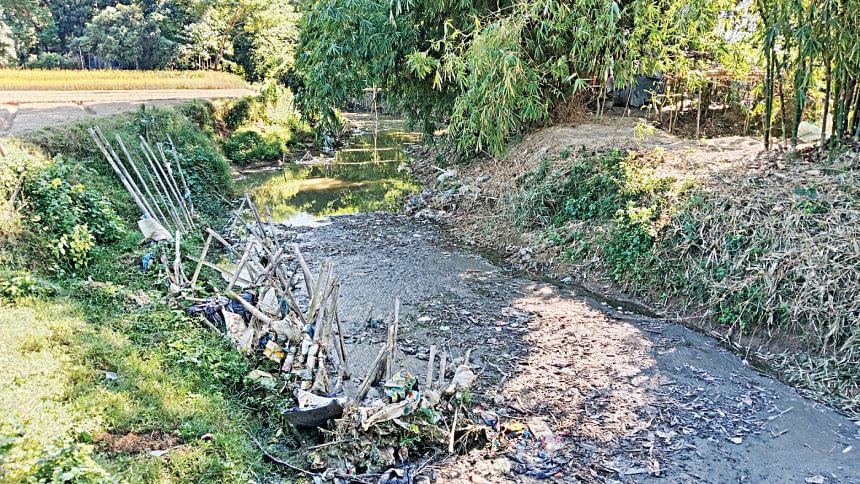10 factories in 5 BSCIC estates running without ETPs

Seventy-year-old Shamsul Haque remembers how clean the Balutikar canal was when he moved to Kallagram village in Sylhet 20 years ago.
Pollution in the water body has severely worsened in recent years, reportedly because of untreated wastewater from the industrial estate of Bangladesh Small and Cottage Industries Corporation (BSCIC) in Khadimnagar.
Among the factories in over 80 BSCIC industrial estates across Bangladesh, 173 discharge liquid waste and 157 of them have set up effluent treatment plants (ETPs), according to BSCIC data.
Seven of these ETPs are closed now while six others are under construction.
It means 10 factories in these industrial estates have not installed any ETPs. These factories are situated in five districts – four in Sylhet, three in Natore, and one each in Mymensingh, Chattogram's Kalurghat and Cumilla's Chauddagram.
Among the factories in over 80 BSCIC industrial estates across Bangladesh, 173 discharge liquid waste and 157 of them have set up effluent treatment plants (ETPs), according to BSCIC data
The 10 factories mainly belong to the textiles, pharmaceuticals, chemicals, pesticides and yarn industries, according to a source in BSCIC.
The source also stated that a lack of space, shifts in the production sector, financial insolvency, and limited awareness about environmental pollution have all contributed to the absence of ETPs in the factories.
In Sylhet, before the factories without ETPs started polluting Balutikar, the water was so good that people could cook food with it and bathe, recalled retired service holder Shamsul from Kallagram village, which was recently added to the city corporation. "Even people from other villages would come here to fish."
Now the stench of water, which looks like tar, is so bad that it is difficult to even walk alongside it. The bad odour spreads through the villages all the time, and sometimes foam and filthy waste gathers.
The canal has been a source of irrigation for Boro paddy in the three wetlands called Haors under Khadimpara union. But the pollution is damaging the croplands, said locals.
The Balutikar canal is connected to the Surma river via the Kushigang river, which means the wastewater from the factories without ETPs is also affecting the rivers.
Officials at BSCIC industrial estate in Khadimnagar said they have no data regarding pollution and environmental damage caused by the four factories without ETPs.
Sources said the four factories are Akther Rubber and Latex Industry, Auto Clean, The Sylhet Top Clean and Hanifi Auto Board Mill.
Nurun Nabi, director of Akther Rubber and Latex Industry, said they could not install an ETP due to a lack of space.
Eight years ago, they applied for a 1,000-square-foot space adjacent to their factory, but the authorities allotted the plot to another larger industry.
Last year, they applied for another small space adjacent to their factory and that too is yet to be allotted to them, he said.
"We got prepared to install an ETP years ago, but the BSCIC officials are giving preferences to larger industries," Nurun Nabi alleged.
Another factory owner claimed that the wastewater his factory produces is not harmful to the environment, rather the insecticide and fertilisers being used by a tea garden near the BSCIC estate are responsible for the pollution of the canal.
Even many of the factories with ETPs are allegedly not using the plants regularly, the owner said.
M Suhel Hawlader, the general manager of BSCIC in Sylhet, stated that the corporation has repeatedly urged the factories to install an ETP or comply with the regulations. However, these factories have cited a land shortage as the reason for their non-compliance.
Badrul Huda, assistant director of the Department of Environment (DoE) in Sylhet district, said they were aware of the water pollution of the Balutikar canal.
Soon, drives will be conducted against organisations that do not have ETP and environmental clearance.
Those who have ETPs should be brought under IP cameras and monitoring should be increased so that they cannot spread polluted waste in the canal, he says.
In Natore, where three factories do not have ETPs, the wastewater from BSCIC estate flows through drains in villages.
The water is so toxic that poultry or livestock die instantly when any falls into the drains, said Rezia Begum, a resident of Doatpara village next to the industrial estate.
"We catch skin diseases and other sort of sicknesses when the wastewater gets mixed up with floodwater and enters our homes after heavy rains," she added.
Shahina Begum, who lives in Goaldanga, another village in the area, also alleged the toxic water of the drains was causing diseases among the residents.
Mihir Hossain, a resident of Dattapara village, alleged the villagers had been threatened when they had spoken up against the influential businessmen of the BSCIC estate.
"We have stopped protesting since the locals get in danger whenever we raise our voice while the businessmen face no action," he said.
Dilruba Dipti, deputy manager of the BSCIC estate in Natore, said the factories without ETPs have been repeatedly reminded of the issue, but they never paid heed to what the authorities said.
Asked about the allegations made by the villagers that the drains were causing health and environmental damage, she claimed no one complained that the drains caused any harm.
An official at the BSCIC head office said the industries without ETPs are frequently warned against producing environmentally harmful products.
The DoE had been informed and urged to take appropriate legal action against the non-compliant factories, the official added.
GM Robbani Talukdar, deputy general manager for the industrial estate and coordination section of BSCIC, said a lack of space on their plots is hindering the factories from building ETPs.
"These plots were allotted a long ago, and at that time, environmental concerns were not as prominent as now. That's why ETPs were not part of their plans," he explained.
Rabbani said that the products that are being manufactured now require ETPs because of the chemicals used for their production.
When the plots were initially allotted, the production units did not use any chemicals that required ETPs, he said.
However, the current layouts of the plots cannot accommodate ETPs.
If there is a vacant plot adjacent to these factories, efforts are being made to allocate for ETPs, Rabbani said.
Alamgir Kabir, general secretary of the Bangladesh Poribesh Andolon, told The Daily Star that the DoE is fully responsible for the factories, which were allowed to run despite polluting the environment.
"If they (DoE) don't have the ability to monitor, why are they allowing these companies to do business?"
Kabir questioned whether unabated pollution would continue to occur if ETPs were not installed due to a lack of space or funds.
[Our Natore Correspondent Bulbul Ahmed contributed to this report]


 For all latest news, follow The Daily Star's Google News channel.
For all latest news, follow The Daily Star's Google News channel. 



Comments